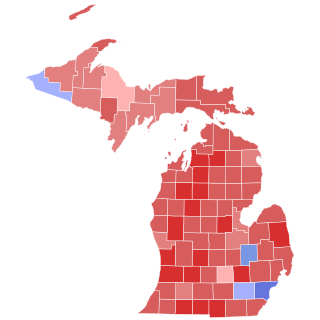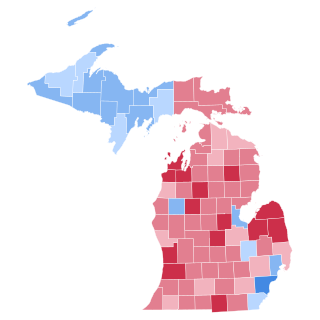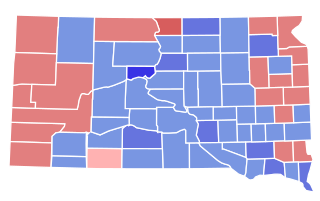
The Reform Party of the United States of America (RPUSA), generally known as the Reform Party USA or the Reform Party, is a centrist political party in the United States, founded in 1995 by Ross Perot.

The Liberal Party of New York is a political party in New York. Its platform supports a standard set of socially liberal policies, including abortion rights, increased spending on education, and universal health care.

There have been 91 gubernatorial elections in the state of New York since 1777, with the most recent being held on November 8, 2022. The next election is scheduled to be held on November 3, 2026.
The Socialist Party of Michigan(SPMI) is the state chapter of the Socialist Party USA in the U.S. state of Michigan. A party by the same name was the affiliate of the Socialist Party of America from 1901 until the national party renamed itself in a 1973 split.

The 1930 New York state election was held on November 4, 1930, to elect the governor, the lieutenant governor, the state comptroller, the attorney general and a judge of the New York Court of Appeals, as well as all members of the New York State Assembly and the New York State Senate.

The 1914 New York state election was held on November 3, 1914, to elect the governor, the lieutenant governor, the Secretary of State, the state comptroller, the attorney general, the state treasurer, the state engineer, a U.S. Senator and a judge of the New York Court of Appeals, as well as all members of the New York State Assembly and the New York State Senate, and delegates-at-large to the New York State Constitutional Convention of 1915.

The 1908 New York state election was held on November 3, 1908, to elect the governor, the lieutenant governor, the Secretary of State, the state comptroller, the attorney general, the state treasurer, the state engineer and a judge of the New York Court of Appeals, as well as all members of the New York State Assembly and the New York State Senate.

The 1900 New York state election was held on November 6, 1900, to elect the governor, the lieutenant governor, the Secretary of State, the state comptroller, the attorney general, the state treasurer and the state engineer, as well as all members of the New York State Assembly and the New York State Senate.

The 1885 New York state election was held on November 3, 1885, to elect the governor, the lieutenant governor, the secretary state, the state comptroller, the attorney general, the state treasurer and the state engineer, as well as all members of the New York State Assembly and the New York State Senate.

The 1854 New York state election was held on November 7, 1854, to elect the governor, the lieutenant governor, a Canal Commissioner and an Inspector of State Prisons, as well as all members of the New York State Assembly.

The 1858 New York state election was held on November 2, 1858, to elect the governor, the lieutenant governor, a Canal Commissioner, and an Inspector of State Prisons, as well as all members of the New York State Assembly and two members of the New York State Senate. Besides, the question was asked if a Constitutional Convention should be held, and answered in the negative: The vote was 135,266 for and 144,526 against.
The 1848 Democratic National Convention was a presidential nominating convention that met from Monday May 22 to Friday May 26 in Baltimore, Maryland. It was held to nominate the Democratic Party's candidates for President and Vice president in the 1848 election. The convention selected Senator Lewis Cass of Michigan for President and former Representative William O. Butler of Kentucky for Vice President.

The 2010 Michigan gubernatorial election was held on November 2, 2010. Incumbent Democratic governor Jennifer Granholm and lieutenant governor John D. Cherry were prohibited by the state's Constitution from seeking a third term. This resulted in a large pool of candidates which was whittled down, when the May 11 filing deadline passed, to two Democrats and five Republicans. Both the Cook Political Report and the non-partisan Rothenberg Political Report rated the election as leaning Republican.

The 1902 California gubernatorial election was held on November 4, 1902, to elect the governor of California. George Pardee won the election with 48.06% percent of the popular vote and was the Governor of California until 1907. This was the first time since 1863 that the Republican Party retained control of the governorship in California.

The 1968 United States presidential election in Michigan was held on November 5, 1968. All 50 states and the District of Columbia participated in the 1968 United States presidential election. Voters chose 21 electors to represent them in the Electoral College, who voted for president and vice president.

The 2022 Michigan gubernatorial election took place on November 8, 2022, to elect the governor of Michigan. Incumbent Democratic Governor Gretchen Whitmer ran for re-election to a second term and faced former political commentator Tudor Dixon in the general election. Whitmer defeated Dixon by a margin of nearly 11 percentage points, a wider margin than polls indicated as well as a wider margin than Whitmer's first victory four years prior. Whitmer won independent voters by double-digit margins, which contributed to Dixon's defeat.

Lorenzo Thurston Durand was an American lawyer and politician.

The 1912 Utah gubernatorial election was held on November 5, 1912. Incumbent Republican William Spry defeated Democratic nominee John Franklin Tolton with 38.17% of the vote against his 32.36% in a four way race, with Progressive nominee Nephi L. Morris winning 21.16% of the vote, and Socialist nominee Homer P. Burt winning 7.89% of the vote.

The 1928 South Dakota gubernatorial election was held on November 6, 1928. Incumbent Democratic Governor William J. Bulow ran for re-election to a second term. In the general election, he faced Attorney General Buell F. Jones, the Republican nominee. Despite Republican presidential nominee Herbert Hoover overwhelmingly defeating Democratic nominee Al Smith overwhelmingly in South Dakota, Bulow defeated Jones by a decisive margin to retain the governorship. In so doing, he became the first Democratic candidate for Governor to receive a majority of the vote in the state's history.

The 1930 South Dakota gubernatorial election was held on November 4, 1930. Incumbent Democratic Governor William J. Bulow declined to run for re-election to a third term, instead opting to successfully run for the U.S. Senate. The Republican nomination was hard-fought and the primary was crowded; because no candidate received 35% of the vote, state law required that the nomination be decided at a state party convention. There, former State Senator Warren Green, the last-place finisher in the primary, defeated Secretary of State Gladys Pyle, the plurality winner. In the general election, Green faced D. A. McCullough, the state's Rural Credits Commissioner and the Democratic nominee. Despite Bulow's success in the preceding two elections, Green defeated McCullough by a decisive margin—even as Bulow himself was elected to the U.S. Senate.





















